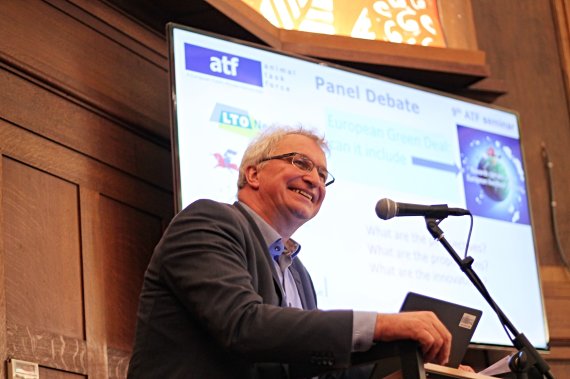Having been general director of WUR’s Animal Sciences Group for 12 years, Martin Scholten is stepping down next month. Did he want to or have to move on? ‘I had my doubts about a fourth term. I’ve been through the cycle a few times now as director of the Science Group. And increasingly I enjoyed the work I did for WUR on circular agriculture and nitrogen that went beyond the Science Group. When I talked to Louise Fresco about that, she was understanding. But I didn’t really want to leave WUR either.’
Brussels
Out of this dilemma came a new job: advisor to the Executive Board on Europe and the regions of the Netherlands. Scholten: ‘It is a temporary post, which has come out of the strategic plan. WUR has been very successful in Brussels when it comes to acquisition of research projects, but we don’t set the tone. The French INRAe is more influential in Brussels, setting the tone in the border zone between research and policy. I want to get involved in that. Wageningen really has something to offer on the green deal, the European vision on agriculture, and biodiversity ambitions.’
Green deal
Scholten knows his way around Brussels: he was a member of the expert group of the Horizon 2020 innovation programme, for example. But now he will have more time to drop in on policymakers in Brussels. ‘In January I was at the directorate-general for Maritime Affairs and Fisheries to talk about marine policy and the green deal. The director said: WUR, help us. We are now working on an integral policy for energy, food and nature at sea. I want to share our findings with Brussels soon.’
‘I want to link up the outside world’s knowledge needs with WUR’s internal world’
Pulse fishing
Scholten would also like to pull together with the ministry of Agriculture, Nature and Food Quality in Brussels. ‘We’ve got to learn from the fiasco over pulse fishing. If you don’t get Brussels on board with innovations, they can run aground. That applies now to the Dutch plans for circular agriculture. The French go about it more cleverly: they form co-productions in science and policy. We should do that more often too, with the French for instance.’
Brexit
Other things Scholten wants to work on include how WUR can continue to collaborate with British researchers after Brexit. He also wants to present a broad Wageningen approach to zoonoses in Brussels, paying attention to sources of viruses in nature, their spread through societies, and fast diagnosis and resilience in animals and people. ‘On this, we at WUR could set the tone with a view to preventing unexpected outbreaks.’ He expects to spend half the week working with Brussels.
Nitrogen
Scholten will spend the other half of his working week on familiar topics in the Netherlands: circular agriculture, nitrogen and biodiversity. ‘All in the regions, because that is where cycles, links between agriculture and nature, and nitrogen emissions reduction take shape.’Scholten is already working on this in the regions of North Netherlands, the Achterhoek, and East Brabant. The regions of Twente/Salland and Zeeland will now be added to his portfolio.
Scholten wants to consistently use the applied knowledge centres and experimental farms to link WUR with the regions. ‘I’m not going to tell the researchers what they should do, because that’s not my job in my new role. I want to link up the outside world’s knowledge needs with WUR’s internal world: that’s what I’m good at.’

 Martin Scholten in Brussels. Photo: Cerebrus
Martin Scholten in Brussels. Photo: Cerebrus